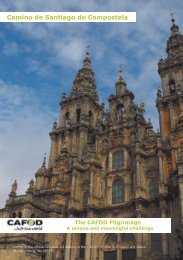Religious Education Curriculum Directory (3-19) - The Catholic ...
Religious Education Curriculum Directory (3-19) - The Catholic ...
Religious Education Curriculum Directory (3-19) - The Catholic ...
- No tags were found...
Create successful ePaper yourself
Turn your PDF publications into a flip-book with our unique Google optimized e-Paper software.
<strong>Catholic</strong> Bishops’ Conference of England and Wales — Department of <strong>Catholic</strong> <strong>Education</strong> and Formation<strong>The</strong> Context of <strong>Religious</strong> <strong>Education</strong><strong>Education</strong> today is a complex task, which is made more challenging by rapid social, economic,and cultural changes. Its mission remains the integral formation of the human person. Pupilsmust be guaranteed the possibility of developing harmoniously their own physical, moral,intellectual and spiritual gifts, and they must also be helped to develop their sense of responsibility,learn the correct use of freedom, and participate actively in social life. 5<strong>The</strong> primary purpose of <strong>Catholic</strong> <strong>Religious</strong> <strong>Education</strong> is to come to know and understand God’s revelationwhich is fulfilled in the person of Jesus Christ. <strong>The</strong> <strong>Catholic</strong> school is ‘a clear educationalproject of which Christ is the foundation.’ 6 In the person of Christ, the deepest meaning of what itis to be human — that we are created by God and through the Holy Spirit united with Christ in hisIncarnation — is discovered. 7 This revelation is known through the scriptures and the tradition ofthe Church as taught by the Magisterium. <strong>Religious</strong> <strong>Education</strong> helps the pupil to know and experiencethe meaning of this revelation in his or her own life and the life of the community which isthe Church. Hence ‘the promotion of the human person is the goal of the <strong>Catholic</strong> school.’ 8Parents ‘are bound by the most serious obligation to educate their children, and therefore must berecognised as the primary and principle educators’ 9 but in this primary task, parents need the subsidiaryhelp of civil society and other institutions. <strong>The</strong> family is ‘the primary, but not the only andexclusive educating community’. 10 Among those who cooperate in the task of education, the <strong>Catholic</strong>school assists in the delivery of a programme of learning in <strong>Religious</strong> <strong>Education</strong> appropriate to theage and particular learning needs of the pupil. This <strong>Curriculum</strong> <strong>Directory</strong> provides a foundation forthe classroom curriculum of such a programme.<strong>Religious</strong> <strong>Education</strong> is central to the curriculum of the <strong>Catholic</strong> school and is at the heart of the philosophyof <strong>Catholic</strong> education. <strong>Religious</strong> <strong>Education</strong> has developed in a way that reflects the particularidentity of our <strong>Catholic</strong> schools in England and Wales. It teaches about the faith in the context of aschool which proclaims the Gospel, and invites the individual to respond to the message of Christ.As the individual responds to this invitation, growth in faith and knowledge helps the pupil to respondto the call to holiness and understand the fullness of what it is to be human. For some, then,<strong>Religious</strong> <strong>Education</strong> will also be received as evangelisation and for some, catechesis.<strong>The</strong> relationship between <strong>Religious</strong> <strong>Education</strong> and Catechesis is one of distinction and complementarity.What confers on <strong>Religious</strong> <strong>Education</strong> in schools its proper evangelizing character is the factthat it is called to penetrate a particular area of culture and to relate to other areas of knowledge.‘As an original form of the ministry of the word, it makes present the Gospel in a personal processof cultural, systematic and critical assimilation.’ 11<strong>Religious</strong> <strong>Education</strong> in schools sows the dynamic seed of the Gospel and seeks to ‘keep in touch withthe other elements of the pupil’s knowledge and education; thus the Gospel will impregnate thementality of the students in the field of their learning, and the harmonization of their culture willbe achieved in the light of faith.’ 12It is necessary, therefore, that <strong>Religious</strong> <strong>Education</strong> in schools be regarded as an academic disciplinewith the same systematic demands and the same rigour as other disciplines. It must present theChristian message and the Christian event with the same seriousness and the same depth with which3
















